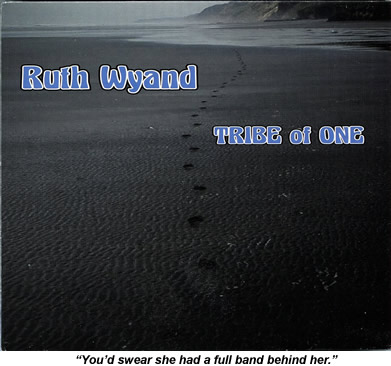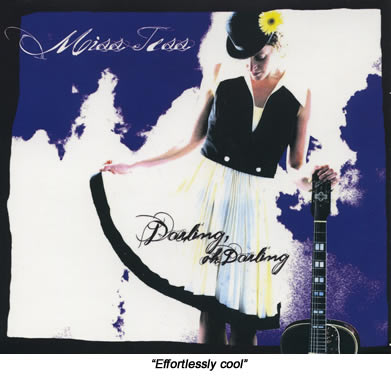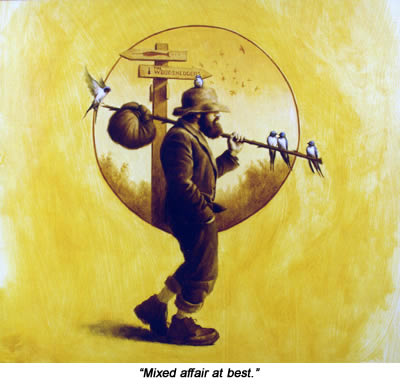 Ruth Wyand: Tribe of One
Ruth Wyand: Tribe of One
Ruth Wyand is a one-woman band - but about as far as you can get from the crass novelty act that description implies.
Instead, she's a talented blues singer, songwriter and guitarist, who just happens to simultaneously play a small collection of foot-operated drums. On some tracks here, those drums are simple and quiet enough to amount to little more than a steady foot-tap. On others, you'd swear she had a full band behind her.
The resulting album combines Piedmont-style fingerpicking with impressive slide guitar work and some slowish gentle ballads. Wyand's from North Carolina, so it's no surprise to find the state's Etta Baker is one of her touchstones. Baker, who helped to popularise Piedmont blues in the 1950s, inspires both a cover of her tune Mint Julep and Wyand's own instrumental tribute on this disc. Both are delightful.
The other standout cover is Bob Dylan's Blind Willie McTell, given a new tune here by Wyand. It's that rarest of beasts - a Dylan cover that's actually better than the original. Wyand's treatment gives the song's cinematic vignettes a sharp focus Dylan's own 1983 recording can't match.
Her own songwriting often has an edge of wry humour about it, particularly when dealing with the subject of unsatisfactory men. The fast, boogie-ish Break The Curse has her fruitlessly turning to voodoo in her bid to forget an old flame, while I Don't Have Proof sets suspicions of infidelity to a dark, spooky blues.
I wrote this review in December 2018, by which time fRoots had become a quarterly. Two issues later, in July 2019, the magazine announced it was suspending publication of its print edition. You can read the editor's statement here.
The Hellhound Sample, by Charles Shaar Murray (Headpress 2011).
James Moon is an old bluesman, who was ten years old when he happened to hear Robert Johnson playing in the street in Clarksdale, Mississippi. Mick Hudson is the stadium-filling rock god who began his career backing Moon with his own fledgling band during the British blues boom and has treated him as a surrogate father ever since. Venetia Moon is James' estranged daughter, now a high-maintenance soul diva, and Calvin, the son she conceived during a brief fling with Mick, runs his own lucrative hip-hop label and associated clothing line.
And Charles Shaar Murray? Well, he's one of the UK's leading rock critics, and the author of definitive biographies of both Jimi Hendrix and John Lee Hooker. He was one of the NME's best writers during that paper's 1970s heyday, where he lost no opportunity to encourage its readers to investigate American blues. In the late seventies, he handled vocals and gob iron for his own Feelgood-esque pub band Blast Furnace & The Heatwaves.
In this, his first novel, Murray spins his tale round the old legend of Johnson selling his soul to the devil in return for a great talent. Acquiring an old guitar of Johnson's as a young man, James flees to Chicago, where he makes his name as a fine bluesman but loses his family in the process.
Touring the UK in 1964, he picks up Mick's Bluebottle as a backing band, and buys the young man a second-hand Telecaster, which - Murray hints - is just as blessed (and cursed) as the old Johnson Stella which James still treasures. Forty years later, nearing his death, James decides his final album must feature all his warring family, and that's when the trouble starts. By the time that album's completed, one of the four musicians has been shot dead, another's hand is irreparably maimed and a third's been driven to a very risky decision.
On one level, the book is a skilful stitching-together of every rock and blues anecdote you've ever heard. Mick, like Keith Richards, equips himself with a gun before going out to score in the worst part of town, and champions James' fortunes in the same way Richards has championed Chuck Berry's. James himself is an amalgam of many great bluesmen, but John Lee Hooker and Muddy Waters show through most strongly. Venetia's early life with her preacher stepdad recalls Aretha Franklin's childhood, and Mick's manager Henry MacShane is Led Zep's Peter Grant in all but name. Calvin has Puff Daddy's dress sense and Dr Dre's magic fingers, while the label he founds - Lock N Load - conjures up Dre's own Death Row and suffers much of the same homophobic, gangsta bullshit.
Even so, Murray makes all his characters real people on the page, bringing not only the four leads to vivid life, but also supporting players like James' formidable nurse. His lifetime in the music business ensures every scene rings true, whether set in 1932 Mississippi, 1964 Soho or 2004 LA. He handles the jumps in time and location well, maintaining the story's clarity even when we see an event's effect before its cause. His descriptions of the tracks James and Mick lay down for that valedictory album are evocative enough to have me wishing I could rush out and buy it.
The supernatural elements of the book are generally placed within the characters' dreams, allowing each reader to treat them as seriously or lightly as he chooses. The Hellhound Sample of the title, for instance, can be taken to mean either a bluesman's soul trapped in the old guitar, or simply the extracts from Johnson's own 1937 recording of Hellhound On My Trail which Calvin pastes into his grampop's cover version.
On the minus side, Murray has an unfortunate habit of letting his characters quote rock lyrics in their casual conversation. This doesn't happen often, but every time it does it strikes such a false note that you're jerked out of the story instantly. Once in a while, he'll wear his research on his sleeve too, giving us for example, an unnecessarily exhaustive account of just how Calvin manages to purge some incriminating images from his laptop. The result is a wasted paragraph which must nonetheless be waded through before the story can resume.
But the book's strengths far outweigh its weaknesses. I first sat down with it intending to read only a couple of chapters, but found it compelling enough to consume the rest of my day. I finished it at a sitting, finally laying it aside at 10:00pm, and still hungry for more. Murray promises another book detailing Mick's adventures soon and - provided he keeps the blues setting in place - I can see this making the foundation for an entertaining series.
This review was originally written for fRoots 341/342 (the November/December 2011 double issue). I knew it was far too long when I filed it, so I've only got myself to blame for the fact that it ended up on the spike. To visit fRoots own website, click here.
 Miss Tess: Darling, oh Darling.
Miss Tess: Darling, oh Darling.
I love this album, and you should buy it today. I love it so much I've just spent my own money on acquiring all Miss Tess's back catalogue. I love it because it's as elegant as Frank and Dino at The Sands, as effortlessly cool as an after-hours party in the Treme, and as smoothly accomplished as Mad Men's Don Draper. I love it, in short, because it's a class act.
Miss Tess grew up in Boston, in a house whose basement hosted rehearsals for her jazz musician parents' big band ensemble. She listened to the sprawling jams held there, learned piano and guitar in her teens, and learned to sing both Willie Nelson's Crazy and Gus Kahn's Dream a Little Dream of Me. By the time she hit 25, her heroes were Ella Fitzgerald and Sarah Vaughan.
Every ounce of that musical heritage pays off in her 12 compositions here, making up an album that's her fourth release but her UK debut. It's divided equally between sassy, brass-driven jazz (Riding Home, That Oo Oo Oo) and jaunty western swing (Train Ride to Caroline, Oh No). The vocals are clean and bell-sharp throughout, and very reminiscent of Laura Cantrell on the title track's sad country ballad. She knows when to dip to the back of her throat for a touch of grit in the vampier numbers, but never lets this become cartoonish.
Her band, The Bon Ton Parade, is led by Alex Spiegelman's horn arrangements on the jazz numbers, and guitarist Lyle Brewer on the country stuff. Spiegelman's clarinet playing is a treat, particularly on Train Ride's extended solo. Brewer's showcase comes in the rockabilly I Don't Wanna See You Anymore, where his fast, intricate guitar pattern suggests he has at least four hands.
Judging by the yearning trombone on Time Can Take The Pain Away and the mournful bass clarinet on the lost-at-sea fable Thinking of Shore, I'd bet someone involved is a big Tom Waits fan too. Shore's lyrics lap each line gently into the next like an ebbing tide: "His lifeboat is sinking / Salt water he's drinking / He must now be thinking ... of shore".
Miss Tess promises some UK gigs in 2012, and we should all go along. But first, buy this album. You'll be glad you did.
 The Woodshedders: O Dig.
The Woodshedders: O Dig.
The Woodshedders are an acoustic four-piece from Virginia with a line-up of guitar, fiddle, bass and drums. They mostly play country and gypsy jazz, sometimes braiding these two disparate styles together into a single song. This album, their second, comes in at a skimpy 34 minutes, and proves a mixed affair at best.
Let's start with the good news. Badger's Blood, the opening track, is an out-and-out country celebration of what I take to be a lethal local brew. There's some downhome wit in the lyrics here ("Woke up laying in a plate of eggs / How in the hell did I hurt my leg?"), and it's easy to imagine the band's live renditions ending in a boozy crowd singalong.
Narwhal is a breakneck instrumental in the Reinhardt/Grappelli style, with Dwayne Brooke and Dave van Deventer trading expert solos on guitar and fiddle respectively. Virginia's Fair Daughters is a gentle country ballad enhanced by some lovely backing vocals from guest Aimee Curl. Sand Grain takes the tune of Dylan's Tombstone Blues, and adds its own cod-poetic lyrics to parody the great man.
If those four tracks were filling a twelve-and-a-half minute EP, then it'd be a pretty good one. But this is supposed to be a full album - originally priced at an eye-watering £30.53 on Amazon - and the fact is that nothing else on it quite measures up.
There's some excellent individual performances - particularly from van Deventer - but all too often, it's as though the band is whipping the horse forward with one hand and reining it back in with the other. The lesser songs are pleasant enough, but utterly forgetable, and there's never a moment when they threaten to achieve take-off. Even Badger's Blood lacks the touch of real abandon which would lift it into Pogues territory.
Slipping Through is white America's familiar travesty of reggae-with-the-bass-missing, and Chicken To Change closes proceedings with a rather aimless stab at funky jazz-rap. This, by far the album's longest track, is described as an "epic jam", which makes me think its main job here was to push the CD's running time past the half-hour mark.
The result is a very short album with not enough good material to fill it. And that's a real shame, because the lost EP at its core promised far better.
I wrote the two CD reviews here in July 2011. When I checked O Dig's Amazon price again ten months later, it had fallen to just £3.80.